How do average people afford downpayments?!
This is partly a vent but also a real question. Maybe my husband and I are missing something. We are currently in the process of hopefully purchasing our 2nd house (nice but modest 3 bed/ 2 bath that is affordable for our income bracket). We are living in our first VERY modest house, which we will need to sell. We both work full time. Our combined income is over $100K, less than $120K. We have no debt other than our home, and our mortgage payment is very low. We own one car (not an SUV...something with decent gas mileage) which we only drive 15 minutes per weekday average. We take public transportation to our jobs. We live frugally. Hardly ever eat out...I mean almost never. Maybe we'll order pizza once in a great while. Our single biggest expense is day care for our two young kids. This is a huge expense, I realize...close to $20K per year.
We can't seem to save any significant money. Maybe my 403B contribution might be a bit too high (it's at 7% of my income; my company matches 4%; I'm 38 so may or may not need to put in that extra 3%).
Anyway, very lucky for us, we are getting some gift $, which is the ONLY way we will be able to afford the downpayment & closing costs on the new house.
How do other average people like us DO this? How do they save enough money? Do most people run up credit card debt so they can pad their savings accounts? I think this must be the case. We each religiously pay off our one card each that we use every month. Maybe some people don't do this? I still say that's the wisest thing. I'm just amazed that anyone making what we make or under can put any sizeable downpayment down these days using only their own money. Yet people do it. I don't get it at all.
Comments (150)
fran1523
16 years agolast modified: 9 years agoMaybe the answer is to continue to live in your first modest house for quite a bit longer. Living below your means is the fastest way to increase wealth.
feedingfrenzy
16 years agolast modified: 9 years agokgwlisa
Your experience is a good illustration of what I've been saying. People do what they have to do if they want to get that first house and that certainly doesn't always mean taking years to save up a 20% down payment.
In fact, saving up to put 20% can actually be a not very savy thing to do, depending on circumstances. It certainly would have been stupid for us to do it when we bought our first house in 1976 because both interest rates and house price went up in the year or two it would have taken us to save the other 10%. We wouldn't have been able to afford any better house than the one we did buy and our payment wouldn't have been any lower. And we would have been living in our crummy (and cheap) rental flat with our new baby, instead of our nice starter house in a much better neighborhood.
Also, there are advocates of leveraging who recommend first time buyers put down as little as possible so that they have the bank's money building equity for them, not their own. I've always been too conservative financially for that, but it does work nicely in an up market. I do know friends who leveraged themselves into pretty expensive houses with that approach, but they were lucky enough to be doing it an an era of up markets.
Who knows when we'll see that again?
Related Professionals
Corpus Christi Architects & Building Designers · Beloit General Contractors · Decatur General Contractors · Lincoln General Contractors · Mankato General Contractors · Millville General Contractors · Mineral Wells General Contractors · Springboro General Contractors · Wolf Trap General Contractors · Honolulu Home Stagers · Lynn Home Stagers · Redondo Beach Home Stagers · Round Lake Home Stagers · South Yarmouth Home Stagers · Jacinto City Interior Designers & Decoratorsmfbenson
16 years agolast modified: 9 years ago"Cell phones, cable, & yes...even Internet may be "common" but they are far from necessities."
My employer views those as so essential that they pay those bills for me. Then again, I have to work a lot of weekends and evenings...
Having internet access is like electricity - I guess you can live without it, but you can't work without it.
I'm not one to gripe about how tough I've got it, but I am certainly finding that I expected life to be easier at the 6 figure income level than it is. I used to think $100K a year was pratically the same as inconceiveable wealth. Now I think of it as struggling to maintain middle class.
qdognj
16 years agolast modified: 9 years agovery well stated,mfbenson...color tv is not a necessity either,nor is a tv greater then 19",lol...the Suze Orman concept of finance is comical
triciae
16 years agolast modified: 9 years agoAmerica is not as wired as you're portraying. Surveys at the bank where my DH is employed consistantly say that half of their customers don't use the Internet. The other half is very vocal about wanting online services.
I don't have statistics but I'd be very surprised if a majority of American employers required an Internet connection & a cell phone as terms of employment.
Heck, 15%-20% of Americans still don't even have bank accounts.
This study is about 5 years old but I doubt the results are all that much different.
"Recent surveys by the Pew Internet Project show that about 80 million American adults -- 42 percent of the adult population -- say they do not use the Internet."
Personally, I would miss the Internet but I could get along fine without it. I don't want a cell phone. DH has a cell phone but only 8 people have the number & 4 of those are family. His cell number used to be on his business cards. The poor man couldn't even use the facilities in peace. Now, when it rings he knows it's either family or a real emergency. Over half the time he doesn't have the d@mn thing turned on & I can't even reach him! lol
Don't get me wrong...there's lots of very valid reasons for having a cell phone. My point is that not everybody needs to incur the additional costs. And, for many, it just doesn't fit into the budget.
/tricia
qdognj
16 years agolast modified: 9 years agoIn Nov 2007:
According to the CTIA-Wireless Association, over 250 million Americans now subscribe to a cellular-phone service. That, if factored against the latest U.S. Census population clock as of Tuesday evening, places the penetration rate at 82.4 percent -- which, I assume, is its highest point ever. In ten years, that number has more than quadrupled from 55 million subscribers in 1997.Seems like cell phones have become the norm, and i know many people who have completely dropped their landlines in favor of cellphones only
qdognj
16 years agolast modified: 9 years agoas of December 2007, US penetration/usage rate of the Internet is 71.1% of population
julietspeaks
16 years agolast modified: 9 years agoI sure as heck wouldn't have a six-figure income without an internet connection at home. That might fly in a low-tech or low-paying field, but that particular budget cut wouldn't work for me.
My parents warned us when we got married not to try to have their standard of living on our entry-level salaries, and they were right. Learning how to be frugal and budget is important for everyone; so is building a healthy savings account and investment portfolio. But as others have pointed out the path to financial security is not the same for everyone, and not everyone should slash spending so deeply into creature comforts that they're too miserable to make it stick.
It's like dieting: cabbage soup doesn't really make it as a lifelong way of eating. (It might get you into that bathing suit, though. Unless you're like me, in which case you'll be face-down in a sheet cake by sundown. Can you tell my savings is automatically whisked out of my paycheck so I never see it? I bet you can.)
robynpa
16 years agolast modified: 9 years agoInternet and cell phones are not luxuries in my house. Both my DH and I need the internet to work from home. Being able to work from home means my DS only needs to go daycare 3 day/week because I can work at any hour of the day or night.
We don't use a landline anymore.
Even my 93 year old grandmother uses a computer to email her kids and grandkids.
I guess it depends on what you do for a living but I would not have the job that I do if I did not have internet access.
galore2112
16 years agolast modified: 9 years agoI never had a landline since I moved here 10 years ago. What's the point? 911?
xamsx
16 years agolast modified: 9 years agojrldh we ended up with a land-line because of our security system. It wasn't until a few months after we had it installed that we found out we could have tied the security system to a cell phone. Grrrrrr
It seems much more common for the under 40 crowd to forgo the land-line and only use a cell. Heck, I don't even know the land-line phone number (I have it written down in my address book). Whereas many people in this thread advise getting rid of a cell phone to save cash I would suggest getting rid of the land-line to save money as the cell phone is, IMO, much more functional.
susanjn
16 years agolast modified: 9 years ago"What's the point?"
If you have youngish children, do you want their friends calling them on your cell phone? There are several years where kids are not responsible enough for their own cell phone, but are old enough to use a phone.
And then there is that boring old 911. Hopefully that problem will be overcome in time.
mfbenson
16 years agolast modified: 9 years ago"And then there is that boring old 911. Hopefully that problem will be overcome in time."
For that to be a problem you have to be hurt badly enough that you cannot tell the emergency operator your address, yet still well enough that you can get to a phone and dial 911 in the first place, and most importantly you have to be in a city that has not joined the 21st century and hasn't upgraded its call center to the Enhanced 911 system than can tell locations and addresses from cell phones by using radiolocation from cell phone towers. Its been a law that cities have to do this since 1999 but the FCC's enforcement has been dismal, as usual. If you're way out in the middle of nowhere, you probably don't have much in way of cellphone service in the first place.
I keep a landline because a) its part of a bundle of internet and fiber optic tv that i get and b) my employer pays that bill, and c) they also pay for my cellphone and d) my elderly father can't seem to realize that there are ways of reaching someone besides dialing their home telephone number.
Someone wants to go without internet access to save some money? Go ahead... I hear the Amish are doing pretty well without electricity too. I've gotten to the point where there's hardly a diffrence.
Not only would I be out of work if I didn't have internet access, my employer would go under pretty quick if it didn't have internet access either. To a large degree those statements are also true regarding electricity.
chrisdoc
16 years agolast modified: 9 years agoInternet:
My VOIP (which requires high speed internet) saves me about $25/month compared to what I was paying for a traditional land line (and I have 911). You can also use the internet to save $ on purchases. Is there a better place to find such a variety of used items? Plus it gives you greater cotrol over your account w/ any large institution you work with (school, insurance, investing etc). I'd say high speed internet pays for itself.
Cell Phones:
Cell phones can be expensive if you want to send text messages and email photos and videos. But if you just want to make occasional/convenient calls then it isn't that bad. I have a family plan where my wife and I found 2 other relatives to join us so we pay about $25/month for each phone. If you young have kids and long commutes it is well worth it. If it came down to it, I'd get rid of my VOIP before our cell phones.
galore2112
16 years agolast modified: 9 years ago"If you have youngish children, do you want their friends calling them on your cell phone? There are several years where kids are not responsible enough for their own cell phone, but are old enough to use a phone."
I don't agree that children who are old enough to have friends to call them on the phone are too young to handle their own cell phone.
sweet_tea
16 years agolast modified: 9 years agoQdog: You certainly can find good statistics that are relevant to posts.
Do you have any recent stats that show the increased stress levels/stress related illness of employees due to working longer hours because of having 24/7 access to work via cell phones, internet connection that allows working from home at all hours and access to the BlackBerry for emailing at all hours.
quasifish
16 years agolast modified: 9 years agoWell, on the topic of the original question, I have to agree with the thinking that people are not putting down 20%. The lending market of the past few years has been such a strange anomaly. The lady who worked as our RE agent was interviewed for a newspaper article and discussed how incredibly different this market is- from the types of loans and lax lending standards. I'm willing to guess that many, many people did creative financing to get into their houses. We are still living in our first house, which we bought with 3% down with FHA.
As far as how people who save the 20% do it? Some are luckier than others and fail to realize how blessed they are. All situations are unique. The key is that the goal of savings has to be a priority. We are a very modest income household, in a fairly high cost of living area, and we save a very high percentage of our income. We are budgeted to a T, remember that being warm and fed is a blessing, and we always save before we spend.
But again back to your original question, I think it is a rare person, particularly in a first time buyer, who is putting down 20%. I'd like to see the lending standard return to that.
mfbenson
16 years agolast modified: 9 years agoUsing old-school rules of thumb, you would buy a house that was valued about 2.5 times your annual income, meaning to get to a 20% down payment you'd have to save 6 months of gross income. If you set aside 10% of your gross income each year, and invest it in something that grows at about the same rate as the real estate market you're buying in, you'd need to save for five years to buy a house.
Honestly, I don't see that flying with the modern-day consumer. People have way too much of an entitlement mentality these days - they would borrow money from bermuda or wherever just to skirt lending standards that are that stringent.
ladynimue
16 years agolast modified: 9 years agoquasifish, your financial/budgeting views are the similar to our family's. Our kids are still young but they still know our simple money 'rules' (probably because I constantly nag about it, lol). 1.) Pay yourself first -save. 2.) Pay your bills. 3. Pay for fun.
chrisk327
16 years agolast modified: 9 years agoMy house was 4-5 times my annual salary when I purchased it. it was the cheapest house in the area. Essentially I would have to save up 14 months of gross salary to get 20%. Net salary that would mean 2-3 years of my salary (with no spending) to get a downpayment on the cheapest house in the area. Now I make twice what I made then I couldn't buy a piece of land to put a tent on for 2.5 of my annual salary.
Quoted from a Newsday (local paper)article "As of December, Nassau's(county) median home price of $447,500 was 5.6 times the median household income in the county"
BTW most people in this country would probably would turn their nose up at that average house as it would be a 3BR 2 bath 1800 sqft house that is 50 years old and needs a new bathroom and a kitchen which would both be 30 years old.
talley_sue_nyc
16 years agolast modified: 9 years agoMy parents warned us when we got married not to try to have their standard of living on our entry-level salaries, and they were right.
My DB and SIL got into big financial trouble right after they got married. My SIL always says it's because they expected to have everything their parents did. After all, they were "grownups" (right out of high school), married, w/ a kid.
It took her a few years to realize that the parents all had nice furniture, etc., because they had a higher earning, and had been around longer to accumulate stuff (and money).
dgmarie
16 years agolast modified: 9 years agoto the OP: if you do not have money to save in the house you have, why on earth are you moving to a bigger one?
busymom2006
16 years agolast modified: 9 years agoWhat a hot topic! Back in '97 DH and I bought a home in a high income area for under 200K. We put 10% down and paid closing costs. Our house has since appreciated quite a bit (even with the market downturn). And we've spent money maintaining and improving it.
Our house was plenty big enough when we bought it a decade ago. But 2 kids and a dog later, it has gotten a bit on the small side. I seem to constantly be donating outgrown clothes/toys to charity just to give us room to breath. It can be a challenge to live so on top of each other.
When I go out to look at more expensive homes, I've been discouraged about how little additional space 100K actually buys in our area. In some cases, the more expensive homes in "better" neighborhoods offer less square footage than our current house does. From what I've seen, we would have to spend at least 150-200K extra to get any substantial amount of additional space. Daunting.
Because we bought when we did and because we're frugal in our spending, we are able to put some money away for retirement and college. Unless I find a to die for amazing deal (and in this weird market anything is possible), I think we'll be staying put for a while.
mandogirl
Original Author16 years agolast modified: 9 years agodgmarie...I understand your question. We are switching townships. Homes are less expensive in the new township. We are getting a bigger house, yes, but our mortgage payment will be managable. Also, one of our kids will be "graduating" from day care this summer and moving on to pre-K in the fall, which will cost half as much as day care costs us for him now. We will still need to really look at spending and cut back, but after examining all angles this is the best move for us now. Our house now is 1300 sq ft. 2 kids, one dog, two adults. no space. no fenced yard. Our house should sell (based on current comps) for at least $320,000. New house in different township (about 2300 sq ft with family room and fenced yard, plus brand new elementary school with taxes only a little more than ours now) costs $370,000. I can't take taxes into account that much because our current township is going to be building 2 new high schools soon and so taxes in the current township will go up as a result, making the taxes in the two places comparable. We are getting a good interest rate on the mortage (6%). It just seems like the best move for us now.
busymom2006
16 years agolast modified: 9 years agoMandogirl - if I could get 1000 extra square feet for 50K I would do it in a heartbeat. Congrats on your new home!
sellin08
16 years agolast modified: 9 years agomfbenson, 2.5 of your gross income? Then no one in my middle class Chicago suburb (pop of 75,000 people) would be able to afford a single family home here.
Average Family income - $81,718
Which means you'd be looking for a house priced about 204,000.
single family homes on the MLS in my suburb priced at $200,000 to 225k - THREE homes.
Single family homes priced at $225k to 250k - 16 homes
Single family homes priced at $300k to $350k- 102 homes
Single family homes priced at $350k to 400k - 91 homes
Single family homes priced at $400k to 450k - 57 homesSo,a majority of single family homes are selling for $300 to $400k here with the brunt (134) sitting at $325k to $400k mark.
FWIW, we do plan on putting 20% to 25% down on our next home which will be our first single family residence. We will be shopping in that middle range. The mortgage payment we'll be paying scares both my husband and family.
lucy
16 years agolast modified: 9 years agoIf a mtge payment scares you, why would you go for it? That's bizarre! Either you can afford it comfortably or you shouldn't be doing it at all. Don't forget there are other costs involved with owning a home (some you won't be able to anticipate), and in times like these with money being dumped right, left and centre, I'd be very leery about spending anything unless I was very sure about what I was doing.
julietspeaks
16 years agolast modified: 9 years agoLucy, it is hardly bizarre to be cautious about making a large purchase. I fret about the amount of money I have to spend on window treatments in the guest bedroom, and that's NOTHING compared to a mortgage!
What would be bizarre is not being worried at all. Though I suppose I'm hardly entitled to make judgments about how others spend their money.
It is, after all, their money and not mine.
sellin08
16 years agolast modified: 9 years agoLucy,
It DOESN'T scare me, it scares my hubby and my parents. We've been qualified to purchase a more expensive home than we are looking for, so I think we'll have no issue with the payment. However, affordable housing is a huge issue here and the number on paper looks daunting to some.
To my parents, any mortgage over $1200 a month is ridiculous. They are still living in 1978, where you could get a home in our suburban area for $60-80k. Currently, their home would sell for about $390k-420k in today's market. I have pointed out to them that this means people who just moved to their subdivision are paying at least $1865 a month if they put 20% down ($80k) or $1632 a month if they managed to save 30% which is a whooping $120k.
The amount of their mortgage when they secured it in 1978? $400 a month. I'd kill for that mortgage payment.
I have many friends who fit the OP's income bracket, but unlike the OP they are still paying of college debt. They are having to buy townhomes (not single family) that are about 45 minutes to an hour away from their jobs because those are the only "affordable" areas out here.
FWIW, when the Bears were in the superbowl last year, the Trib published a fact sheet on living in Chicago. The average mortgage for the whole metro area was $1,678 a month.
Sellin
mfbenson
16 years agolast modified: 9 years ago"mfbenson, 2.5 of your gross income? Then no one in my middle class Chicago suburb (pop of 75,000 people) would be able to afford a single family home here."
Precisely - which shows you just how far away from fundamentals this bubble got. The big question is whether or not prices will return all the way to a sustainable level or if they will plateau at some point higher than the historical norm.
mfbenson
15 years agolast modified: 9 years agoMarymt, you have very articulately outlined the problems and clarified them - I look forward to reading more of your contributions.
However, I don't see anything here that answers the original question - it seems like your answer is "well, due to these intractable problems, you DON'T afford a downpayment". Which, perhaps, is such an honest answer that it is difficult to swallow.
Something has to give. My father's tiny two bedroom house costs a half a million and he can't figure out why I can't afford to live near him, despite an income around six figures.
qdognj
15 years agolast modified: 9 years agoWhat one needs to consider,is that few buyers of homes priced significantly above the median price in their particular area is a 1st time buyer..You get to buy those homes after you have already own a home and trade up.I couldn't afford my present home based on salary alone if we didn't keep trading up over the years..Equity and appreciation(primarily appreciation) enable you to buy homes priced above the median
marymt
15 years agolast modified: 9 years agoThanks, mfbenson -- qdognj makes a good point that, ideally, you start small and trade up.
But it's so hard for someone just starting out in their career to afford a down payment on even a condo (especially while paying off student loans). I guess the best way to start out is to keep your credit clean, don't fall in love with the wrong person (!), get a humble place with resale in mind, and apply for an FHA loan.
But life isn't always so neat; sometimes you DO fall in love with the wrong person, or realize you're in the wrong profession, or suffer an injury or illness, or buy in a real estate bubble. If you can at least keep your credit clean (or clean it up retroactively), eventually anything is possible.
My post was partly in empathy for people who are struggling, because I meet them every day and several posters seemed to be saying this generation isn't sacrificing like previous generations did. But it's a whole different world today. Don't begrudge young people their iPods and cell phones; it's the way the world is turning, and they have to function in it. It isn't the $100 iPod that's keeping them from home ownership -- it's the crushing student loans, housing prices, low wages for liberal arts types, child care, and other factors that are more significant, IMHO. This generation is making sacrifices, is settling for less, and is shifting paradigms on home ownership.
Jane_the_Renovator
15 years agolast modified: 9 years agoWe saved and saved and saved. We applied Amy Dacyzyn's principles. But the main reason we were able to afford our NYC apartment and our current Jersey City house was because we weren't afraid of what my coworker called "downmarket areas."
My rents were always affordable, and the areas I lived in became hipster neighborhoods--usually right after I moved out (snicker).
Low rents and a willingness to buy a fixer-upper in an area that many Manhattanites (or New Jersey residents) wouldn't venture into enabled us to save for and buy our home.
No, I don't live (and never have) in neighborhoods with bullets flying around me. My mother actually said about our last neighborhood, "It's not a bad neighborhood, it's a working-class neighborhood!" When people got snobbish about where I lived, I told them that personally, I had no problems living in a neighborhood where my neighbors made the same amount of money I did.
dgmarie
15 years agolast modified: 9 years agoThere is no average person. There is also no definition of middle class (research shows that people making $100K+ per year conider themselves middle class, as do people making $50K a year--it's all relative).
If you want to save money, simply live below your means. You'll save a ton. The problem is too many people feel they need too much. We have never borrowed from anyone except the mortagage company and have zero debt on CC or otherwise. We live very comfortably and save 50% of our net income per year with two kids and a high property and income tax bracket. It can be done.
disneyrsh
15 years agolast modified: 9 years ago"It isn't the $100 iPod that's keeping them from home ownership"
Yes, it is. You pay a buck a song after you buy that thing. Dollar here, dollar there.
"it's the crushing student loans"
No, not if you go to a college where you get grants and scholarships, or go to school at night while you work. Both of which I did. No school debt.
"housing prices"
Only if you can't accept your first house is going to be VERY modest.
"low wages for liberal arts types"
So don't get that kind of degree.
"child care"
Don't have a kid until you can afford it. There's this nifty stuff out there called Birth Control, and it works as advertised, most of the time.
"This generation is making sacrifices"
I'm a Gen X'er, and I haven't seen it. This generation is charging crap like there's no tomorrow.
"is settling for less"
What?!!! Lady, are ya smoking crack?
"and is shifting paradigms on home ownership"
Huh? Where's my liberal arts degree to help me decode that one...
vigna_caracalla
9 years agolast modified: 9 years agoI take it it's official that Disney is a jerk?
I was doing some late-night searching on saving for a down payment. Then I came across this post and thought it was interesting to see how a high-income couple were struggling to save.
It's years later, after the economy tanked when this post was originally written. I can say it is even more difficult to save unless things "go right" for you. By "go right" I mean never lose your job, have little debt, were able to even get a job, amongst other things.
I was laid off from international outsourcing in my late 20's. Never thought it would happen to me. The idea of saving for a house isn't even on my priority list anymore. My husband has lost his job before, too. We live in reasonable housing, but often find our expenses are quite high. We don't go out to eat more than 3-4x a year. We keep our grocery bill low. I mostly use gift cards, coupons, and bday/Xmas money to shop for clothes and shoes. I was fortunate to get a job less than 10 miles away. We have always had to take jobs with long commutes (about 15-20 miles) because we needed jobs.
I think people often don't realize how the cost of living area, childcare, unexpected expenses, transportation, and job loss can affect finances. My medical bills over the past few years have been high because of my health issues. Many of these issues aren't things I can just "track my expenses" because hello, no one asks to end up with health issues.
I only posted because after reading Disney's vitriol, I felt compelled to point out that it's not so simple for everyone. There are people who were able to "afford" a kid, and then when the kid was a baby, lost their job and suddenly couldn't afford much. There are too many uncertainties in life these days.
Acadiafun
9 years agolast modified: 9 years agoI understand the vent and the question from the same perspective although I am a bit older then you (still a "generation X" kid though). I too make over 100K and live frugally, yet saving money is hard. I spent most my money on my kids, and their private schools, college, housing and cars. My daughter has a nicer house and better car than I do and she is in her 20's. But she struggles to keep up financially. It is a hard economy.
To answer your question most of my friends had parents who helped them out with their education,house payments, car payments and childcare. Some of my older friends later lost their parents and inherited money. I can't think of any of my friends who payed for their own education, and were able to buy a nice house and raise their kids without help. I am sure there are people who do but I really don't know them.
melle_sacto is hot and dry in CA Zone 9/
9 years agolast modified: 9 years agoI'm glad this thread was revived, I often wonder how people do it :-) My DH and I bought our home ourselves with our savings and also through a program called NACA (Neighborhood Assistance Corporation of America). IDK if the program is the same, now, as it was 14 years ago when we went through it. We both have science degrees. We both started working when we were 16 (DH I think worked even younger delivering papers), and we worked through college as well. I'm proud we did it all ourselves, but I do feel like what we've achieved isn't "good enough".
That said, as much as we need a bigger home, now that we have kids etc, it's not happening. We STILL have to save a down payment, and the value of our home, right now, is about what it was 14 years ago. Our equity would not move us to a bigger home in a nicer neighborhood, it would be a cruddy home at the same size in a nicer place, or a bigger home here but if we're going to stay here then I would just stay in the house we already have. Over the years so many things have had to be re-done -- kitchen, both bathrooms, and we're looking at needing a roof in a few years plus HVAC.
This is the modest product of people who paid their own way w/o help. It gets you a modest lifestyle. Most of my friends are in similar situations. The only friend who is in a pretty nice, more expensive home in a more exclusive neighborhood has family in real estate (and her DH is a realtor). They have had more opportunities to score great homes at great prices.
I think the people who afford the really nice places...either they are taking on more than they should, or they have assistance from family, or they got really lucky/successful with business or investments. A friend of mine told me that when she bought her home, her real estate agent was shocked that she had saved her down payment herself; the agent said most young people are using "gift" money from relatives.
ncrealestateguy
9 years agolast modified: 9 years agoLet's say an avg. first time home buyer property costs $150,000. An FHA loan requires 3.5% down payment. That is $5250.
If you join the armed services, you can get a VA loan for zero down payment.
If you purchase a home that qualifies for a USDA loan, not only can you get a zero down payment loan, you can get financing for up to 105% of the sales price.
In regards to the first scenario, if you can not save $150 per month for 3 years, then you probably can not afford to own a home.
I realize that America's disposable income has gone down over the last 7 years, prices for goods have gone way up, and good jobs are scarce. That's the problem that needs fixing.c9pilot
9 years agolast modified: 9 years agoAgree with everything NC RE Guy says. If you can't save some amount each month, you're not going to be able to afford a house.
Everyone focuses on the monthly payment (mortgage, taxes, insurance). Fine. In the past six months, we've had to fix our A/C three times (will replace this winter even though the unit is only about 10 years old), fix one freezer (unit only 6 years old, couldn't afford an "authorized" guy so went with a "used-to-be-an-authorized" guy), replaced two leaky faucets (Moen lifetime warranty, but without sinks for numerous days waiting for parts to arrive - they were only 6 years old), leaky shower knob, fallen gutter, three pool equipment issues (only 4 years old), and fix the washing machine. I've still got to get around to ordering baseboards for the foyer and paint some trim outside, fix a few screens, broken sprinklers, etc etc etc.
Besides the house, my hubby had to fly out to CA last minute for a funeral, and we had to get another car, but I still need to get the repairs done on the other car where someone backed into my hubby (below the cost of the deductible). I need to get a new wheel for my trailer. The dog is overdue for her trip to the vet. My mom's cat needs a teeth cleaning ($375!?!). Holidays are coming up. Etc etc etc.
So yeah, there are a lot more money drains on the house and household besides the payment, and if you can't save now, you're not going to be able to afford basic maintenance, even on a new house.
The only reason we could afford any of this stuff (houses, pool, cars, pets, etc) is that we never bought the most expensive that we could afford. We see so many younger people (20's-30's) buying the most expensive houses and most expensive cars that they can get loans for, but that doesn't mean they can afford them!
western_pa_luann
9 years agolast modified: 9 years ago"I think the people who afford the really nice places...either they are taking on more than they should, or they have assistance from family, or they got really lucky/successful with business or investments. "
There are other reasons.
They are living where owning a house is cheaper than renting.
They are smart with what money they have (live within their means).
They did not get into student loan debt.It IS possible.
I know many twenty- and thirty-somethings that have done it...
and they are NOT taking on more than they should, NOT getting help from parents, NOT successful with business/investments as they are still too young.vigna_caracalla
9 years agolast modified: 9 years ago"There are other reasons.
They are living where owning a house is cheaper than renting.
They are smart with what money they have (live within their means).
They did not get into student loan debt.It IS possible.
I know many twenty- and thirty-somethings that have done it...
and they are NOT taking on more than they should, NOT getting help from parents, NOT successful with business/investments as they are still too young."The truth is, unless we personally see how things work inside someone's home, we really never do know.
What I do find out and have observed is the people who make it work are often lucky. They just are. They got the right jobs, graduated at the right time, knew the right people, etc. They lived in the right place at the right time. They had the right family to be supportive to help them on their path to success. There are just some things we can and can't help, and sometimes those are our circumstances.
I bet none of those people had health problems before age 25. Or had their parents cut them off for not doing what they want. The younger couples I know of who have homes with families got married or pregnant *very* young (around 20 or 21), and then had to work their butts off because they had no other choice. Then they lived with their parents for a little while before having their own homes. I wish I could say some people had those choices but for many, they are far from ideal.
People talk about not having student debt and only going to college when you can afford it. I want to hear an answer about how you get a job without a college degree nowadays. Sometimes to live you have to be in debt about 5K-10K in order to get a job that starts out with 40K. What are you supposed to do, hope to work your way up at some call center and be breaking 35K within 4 years? Then how do you ever hope to get married and support a family, let alone save for a house?
KarenPA_6b
9 years agolast modified: 9 years agoI have always wondered how the old folks do it. Back in the 60's &70's when a family can live comfortably and own a house with the income of only one parent. Now with 2 parents working and there is still not enough money to pay for a downpayment. Something is wrong. Seems to me that our money can't buy much these days.
LanaRoma
9 years agolast modified: 9 years agoThe real wages have declined a lot in America. This fact is reiterated in hundreds of online articles and discussions on the U.S. economy.
Our town has announced an 11% cost increase for residential water & sewer. Oh joy.
LanaRoma
9 years agolast modified: 9 years agoThe article below is to help put things in perspective re: socioeconomic trends in the U.S.
Another piece of statistics floating on the Net:
In the U.S. more than 60% of all consumer spending is done by just the top 20% of income earners.
azmom
9 years agolast modified: 9 years ago"What I do find out and have observed is the people who make it work are often lucky. They just are. They got the right jobs, graduated at the right time, knew the right people, etc. They lived in the right place at the right time. They had the right family to be supportive to help them on their path to success. There are just some things we can and can't help, and sometimes those are our circumstances."
I disagree with the above opinions. Contributing others' success to their 'luck' is ridiculous. For example, no amount of "support" from family could allow a student graduate from top tier school in challenging majors with a sterling GPA. They have to WORK for it.
Hiring managers/business owners will always pick top talent for job openings to fulfill their business needs. Believing successful people are being put on the pass to by their families without their own talent and tremendous effort is a fantasy to say the least.
Numerous home owners spend years working their tails off to establish themselves and saved up downpayment. Postings from rivkadr and popsicle_toe's ..etc. on this thread are good testimonials.
Life is full of choices, priority, goals and obstacles. Choices and priority come with consequences. Making choices and priorities to fulfill goals and deal with obstacles definitely are our responsibilities.
ncrealestateguy
9 years agolast modified: 9 years agoPlenty of non biased research shows that a person's chance of being poor in America virtually go away if that person does three things...
1. Gets at least a high school education
2. Gets married and stays married.
3. Gets married before having children.
I have thought about this before, and it sure seems to still make sense today.
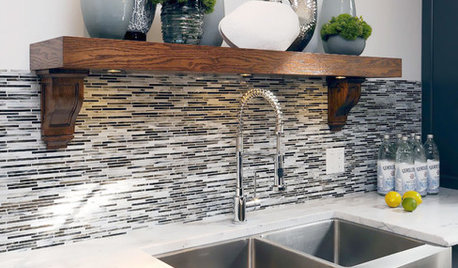
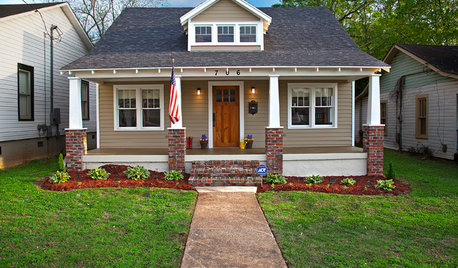
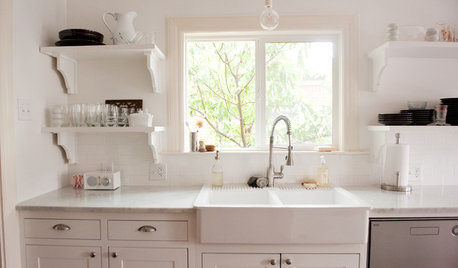





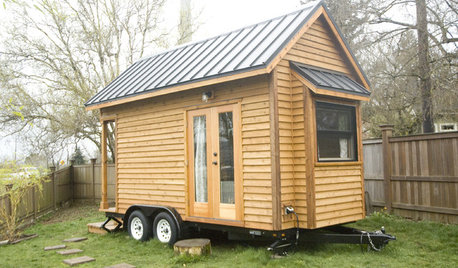
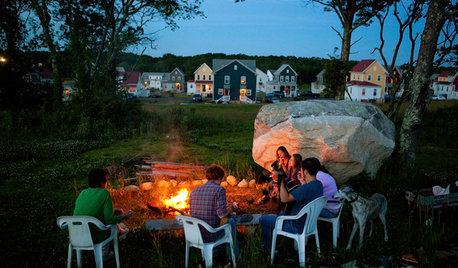








marymt